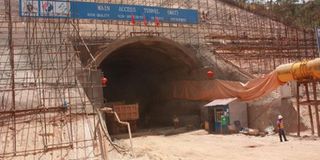Karuma dam construction on schedule – Energy ministry

Workers at the main access tunnel of the Karuma Hydro power project in Kiryandongo District. FILE PHOTO
What you need to know:
Timeline. The project is expected to be complete by December 2018.
Kampala. Uganda’s largest power project, Karuma Hydro power Dam, works are on schedule, according to a ministry of Energy official.
Mr Fred Kabagambe-Kaliisa, the permanent secretary Ministry of Energy and Mineral Development confirmed that construction works was in the range of 27 to 30 per cent.
“The powerhouse excavation is near completion. That is the most important aspect of the construction of underground power systems and stations like Karuma,” Mr Kabagambe-Kaliisa said in a statement after carrying out an on-spot inspection of the project on Monday.
He further said: “Overall construction progress of the Karuma Hydropower Project is on schedule.”
The 600MW Karuma Power Dam is located in Kiryandongo District and is being constructed at a cost of $1.4b (Shs4.8 trillion).
It is projected to be completed by December 2018 if no delays are encountered.
The start of construction works had been initially delayed by almost a year after the Uganda government and the lender; China’s Export and Import Bank were yet to agree on disbursement of funds.
“We are very optimistic that we shall complete the project in December 2018. Once the project is not delayed but progresses as scheduled, then the electricity tariffs can be controlled,” Mr Kabagambe-Kaliisa added.
Cost of power
The current cost of power from the Bujagali Hydro Power Project is 12 US cents (Shs409.2) per Kilowatt Hour, according to the Uganda Electricity Generation Company (UEGCL). Additionally UEGCL also estimates that the cost of generating electricity from the heavy fuel generators is 18 US cents (Shs613.8) per kilowatt hour. With Karuma, a power purchase agreement with power distributor Umeme is yet to be signed but estimates indicate that the cost could fall to 5 US cents (Shs170.5 ) per Kilowatt Hour.
The cost has been subject of concern from the business community from associations such as the Uganda Manufacturers’’ Association.
The tariff regime has seen the cost of power continuously rise for the last three years. This, in turn, pushes up the cost of production.
The higher cost has been blamed on commercial loans acquired in the construction of the Bujagali Power Dam.
Mr Kabagambe-Kaliisa said the decision by government to borrow money from China provides for a lower interest rate, which would translate into lower tariffs.
“The cost of borrowing for Karuma project is 3 per cent. This is low compared to a weighted average capital of 13 – 15 per cent, if the money is from private capital,” he said.




